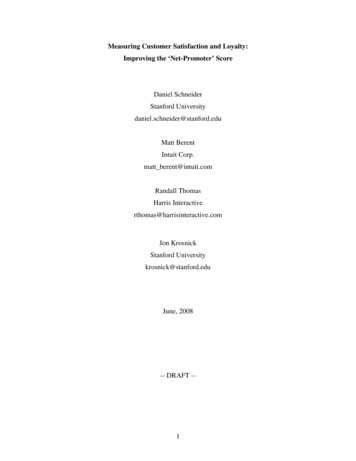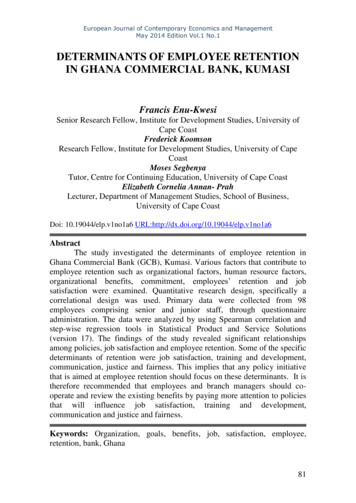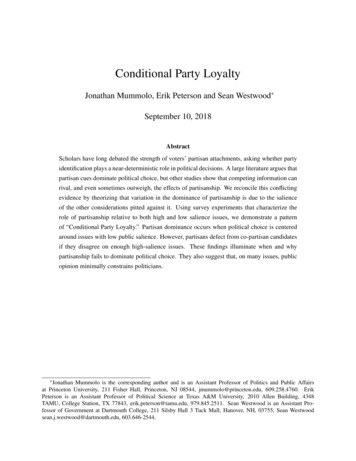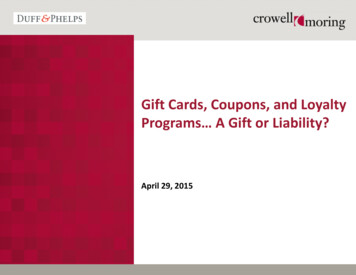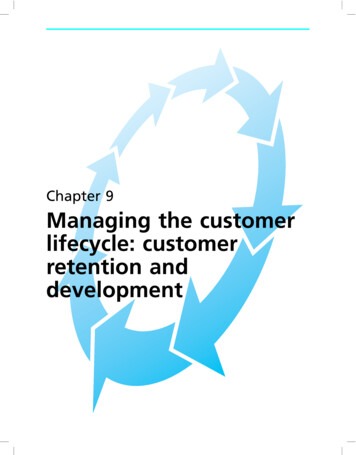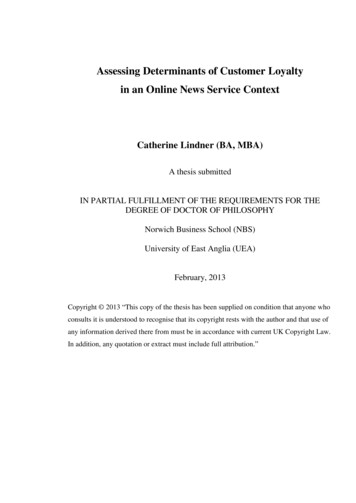
Transcription
Assessing Determinants of Customer Loyaltyin an Online News Service ContextCatherine Lindner (BA, MBA)A thesis submittedIN PARTIAL FULFILLMENT OF THE REQUIREMENTS FOR THEDEGREE OF DOCTOR OF PHILOSOPHYNorwich Business School (NBS)University of East Anglia (UEA)February, 2013Copyright 2013 “This copy of the thesis has been supplied on condition that anyone whoconsults it is understood to recognise that its copyright rests with the author and that use ofany information derived there from must be in accordance with current UK Copyright Law.In addition, any quotation or extract must include full attribution.”
DeclarationI certify that the ideas, results, analysis and conclusions reported in this dissertation areentirely my own effort, except where otherwise acknowledged. I also certify that this workis original and has not been previously submitted for any other award.ii
AcknowledgementsThis project has truly been an Odyssey for me, albeit a slightly shorter one time-wise thanthe original; and I have many to thank for providing assistance and support along the way.First of all, and most of all, thank you to my two supervisors, Professor Stuart Barnes andDr. Linda Peters without whose support, input and guidance this project would never havegotten started, let alone completed – a genuine thank you to both of you for your time andpatience in reading through and providing input on the copious amounts of text and mynumerous chapter revisions. Taking on the roles of Hermes and Athena for me, likeOdysseus, without your help I would not have been able to complete this journey.Thank you to Professor Narish Pandit, Dr. Hongwei He and Dr. George Smith whoprovided invaluable input and support at the beginning of the project, and to ProfessorFiona Lettuce for her help through the Scylla-, Charybdis- and Polyphemus-like challengesof the process; through the more taxing periods I encountered. I wish to say a special thankyou to Professor Patricia Roos from Rutgers University for inciting my interest in socialresearch at the onset. A special thank you to Manfred Werfel and his colleagues at IFRA isalso essential for their support during the various phases of this project.A colossal thank you to my own personal Penelope and Telemachus (albeit of the oppositesex); to my husband, Uwe, and daughter, Anna. Over the years and throughout the processyou have been exceptionally understanding and patient and I am forever indebted to you.Thank you also to my parents who provided continuous impetus to continue and finish thisproject, and to my friends Clare, who encouraged me to start (moving far away shortlyafterward) and Barbara who, like my parents, has always believed in my ability to achievewhatever I strive for, no matter how challenging.Like Odysseus, I am happy to be back “home” now and to be able to move on to otherprojects, confident that the knowledge and experience I have gained through the completionof this thesis will remain with me and greatly enrich my future endeavours.Grainau, February 2013iii
AbstractNews consumption has become a central aspect of everyday life in modern societies and inrecent years online news websites have become an increasingly popular source. This thesisexamines online news consumption and customer loyalty to online news websites. Usingthe underlying theoretical perspective developed from the debate between socialconstructionist and technical determinist stances in technology acceptance and usage, thisthesis examines the application of domestication theory to online news service consumptionand loyalty. Based on loyalty literature and the conjecture from Oliver (1999) thatcustomers can be enveloped in a community of loyalty which will aid and direct their(purchase) decisions, this thesis additionally looks into the role of an online news site’scommunity in fostering loyalty. A research model to test the effect of online communityparticipation on the previously empirically supported link between perceived value andloyalty was created. Constructs to support the community variable were derived fromliterature and refined through exploratory research and are introduced in this thesis.Furthermore, measures for domestication stages were derived from the literature and furtherdeveloped through exploratory research with online news site users and are also introducedin this research.This research examines the use of domestication theory in understanding news serviceconsumption and adds to the growing body of domestication literature as well as adding tothe emerging literature on, and increasing the understanding of acceptance and usage ofonline news services. The study helps to close a gap in the literature by employing aperceived value – community – loyalty model to identify which perceived valuecomponents have an influence on user loyalty to online news services. The loyaltyenhancing value of an online community was also tested and supported in a news sitecontext.iv
Table of ContentsCHAPTER 1 INTRODUCTION . .6.21.6.31.6.41.6.51.6.61.6.71.7INTRODUCTION . 1BACKGROUND TO THE RESEARCH . 2RESEARCH QUESTIONS AND OBJECTIVES . 5RESEARCH METHODOLOGY . 6Phase One: Exploratory Research . 6Phase Two: Confirmatory Research . 10SIGNIFICANCE OF THE RESEARCH . 11Practitioner Contributions . 12Theoretical contributions . 13Summary of Practical Implications . 14ORGANIZATION OF THE THESIS AND CHAPTER SUMMARIES . 16Chapter 1 : Introduction. 17Chapter 2 : Theoretical Foundation and Conceptual Model . 17Chapter 3 : Methodology . 17Chapter 4 : Exploratory Research Results . 18Chapter 5 : Confirmatory Research Results . 18Chapter 6 : Discussion . 18Chapter 7 : Conclusion . 18CHAPTER SUMMARY . 19CHAPTER 2 THEORETICAL FOUNDATION AND CONCEPTUAL MODEL. .52.62.6.12.6.2INTRODUCTION . 20LITERATURE OVERVIEW . 23NEWS SERVICES INDUSTRY. 27Overview. 27Convergence in the news media industry . 29Online news services – business challenge . 31Technological impacts on news publishing . 32Citizen journalism and interactive discourse . 34Summary of News Services Literature . 36THEORETICAL APPROACH . 37Domestication Theory . 38Background of Domestication Theory . 40Components of Domestication Theory . 40Social Constructionism and Technical Determinism . 44A historical perspective to the debate. 57Summary: Technical and Constructionist Perspectives and Domestication Theory . 60OTHER THEORETICAL APPROACHES IN ELECTRONIC SERVICES ADOPTION . 62Diffusion of Innovations Approach . 63Technology Acceptance Model . 67Theory of Reasoned Action . 68Theory of Planned Behaviour . 69Unified Theory of Acceptance and Usage of Technology . 71LOYALTY . 73Brand Loyalty . 74Brand Loyalty and Customer Loyalty . 79v
22.8.32.92.102.112.12Value, satisfaction and loyalty . 81Loyalty research in the electronic services context . 84PERCEIVED VALUE . 85Quality, Satisfaction and Perceived Value . 86Cost aspects of Value . 88Experiential and Non-Utilitarian aspects of Value . 90Measuring Perceived Value . 92The Conceptualization of Perceived Value in this Research . 93ONLINE COMMUNITIES . 96Evolution of the Online Community . 100Social and Technical drivers of Online Communities . 109Online Community Components Introduced in This Research . 111SUMMARY OF THE LITERATURE REVIEW . 125INADEQUACIES IN THE LITERATURE AND CONTRIBUTIONS OF THIS RESEARCH . 127CONCEPTUAL MODEL . 128SUMMARY OF CHAPTER 2 . 129CHAPTER 3 METHODOLOGY . 3.4.13.4.23.53.5.13.5.23.5.33.5.43.6INTRODUCTION . 131RESEARCH PHILOSOPHY . 134Ontological Assumptions . 136Epistemological Assumptions . 138Philosophical approach to the understanding of human nature . 141Methodological
online news services. The study helps to close a gap in the literature by employing a perceived value – community – loyalty model to identify which perceived value components have an influence on user loyalty to online news services. The loyalty enhancing value of an online community was also tested and supported in a news site context.
